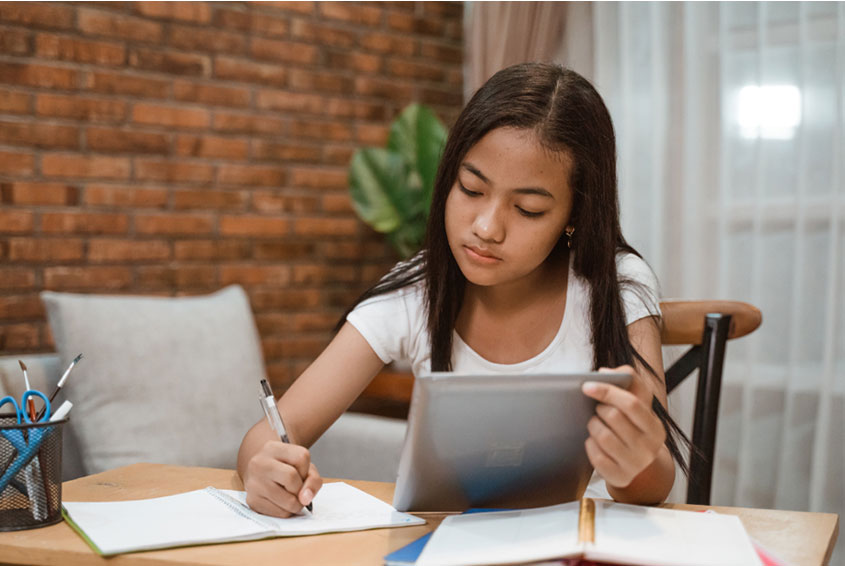ICAS practice: 6 proven methods to help your child succeed
- Categories Blog
- Date January 25, 2023

ICAS is peeping over the horizon again. If you want your child to get the best possible result (dare we say, even win a medal), it can help to have them practise. ICAS questions are different to anything they’ll see at school, and exam technique can confuse the smartest of students. Supporting them in the lead up to ICAS with dedicated revision can make a real difference, improving their confidence and giving them the chance to stand out from the class.
Below are six proven methods for practising ICAS exams to help your child succeed.
1. Learn which skills are being tested
As with most exams, ICAS assessments are broken down by subject. Within each subject is a range of skills that may be tested. If your child knows what these are, they can better prepare for the exam.
You can find samples of these skills within our ICAS subject pages (taken from the official assessment framework), which we strongly recommend reviewing for the test papers your child will be sitting.
2. Practise with ICAS past papers and sample questions
Exams change each year, to keep questions fresh and relevant for students. The types of skills tested, the question styles and the exam layout remains similar each year for ICAS, so what better way to prepare than working through past papers?
ICAS past papers can be purchased via our website. Due to the vast amount of work that goes into preparing these papers, from test developers, academic consultants, designers and analysts we do charge a small fee to access these papers. To learn more, check out our blog on why free ICAS past papers don’t exist.
When practising the exam, it can also help to start with the answer first. This may seem counterintuitive, but because ICAS questions have multiple ways to reach the answer, working backwards from the solution can help your child envisage potential pathways to problem solving and strengthen this hard-to-teach skill.
3. Remove distractions
We live in an age of distraction, filled with buzzing phones, blaring televisions, and adverts blasted at us from every direction. Having the willpower to focus can be hard, even for adults. It’s even more difficult for our children who are still developing and learning (we hope) the ability to resist temptation.
To improve your child’s ICAS practice, have them sit at a table in a quiet part of the house. Turn off their phone, the TV and remove laptops or other distracting devices. If they need the internet consider installing a website blocker to prevent them from accessing social media or other distracting sites while they study.
4. Don’t overdo it
Problem-solving is strenuous for everyone, especially for younger children. According to former teacher and ICAS assessment consultant, Nardin Hanna, practising in 30-minute chunks is the most effective way to help your child stay focused. Short bursts of study followed by a break and a run around the backyard can help consolidate information in the brain and encourage focus. The best way to prepare for ICAS is to start in the weeks leading up to the test and organise daily, short practice sessions. Cramming everything in the night before is not only unhelpful, it can stress your child and negatively affect exam performance!
5. Organise a study group
Study groups are a great way to prepare your child for ICAS. Two heads are better than one, after all. And three heads can be even better! Just be sure to help the group stay focused on their study and not get distracted by chatting.
Consider encouraging your child to form a small study group with friends or classmates, where they dedicate time after school going over their tested subjects and are rewarded at the end with Xbox or PlayStation time. It can be a great way to help motivate them to prepare for ICAS.
6. Try RiSE+, a dedicated assessment practice platform for ICAS
If your child is taking the ICAS English or Maths assessment, and they’re in Years 2 to 7, they can practise ICAS-style tests online in the actual platform the ICAS exams are delivered on. This gives them a real advantage on test day, because they will already be familiar with the platform, and have a little more confidence for ICAS itself. RiSE+ is an assessment system developed specifically to help students prepare for ICAS and NAPLAN, and improve their scores in the process. They will have a dedicated log in and access to English and Maths practice papers developed by the same educators that write the ICAS exams! RiSE+ gives you personalised progress reports that track your child’s performance and provide you with immediate and actionable feedback on their strengths and weaknesses, so you can help address any knowledge gaps. To learn more about how RiSE+ can help, check out the following page: RiSE+ ICAS practice tests.
We all want to help our children succeed at school and achieve the best results they can. By following these six steps, you can help your child build exam confidence and stand out from the class. And you never know, with your support they may even step up to join other top students from around Australia, New Zealand and the world to receive a coveted ICAS medal of their very own.
Next post
How school competitions enhance learning and grow your students’ knowledge
You may also like


